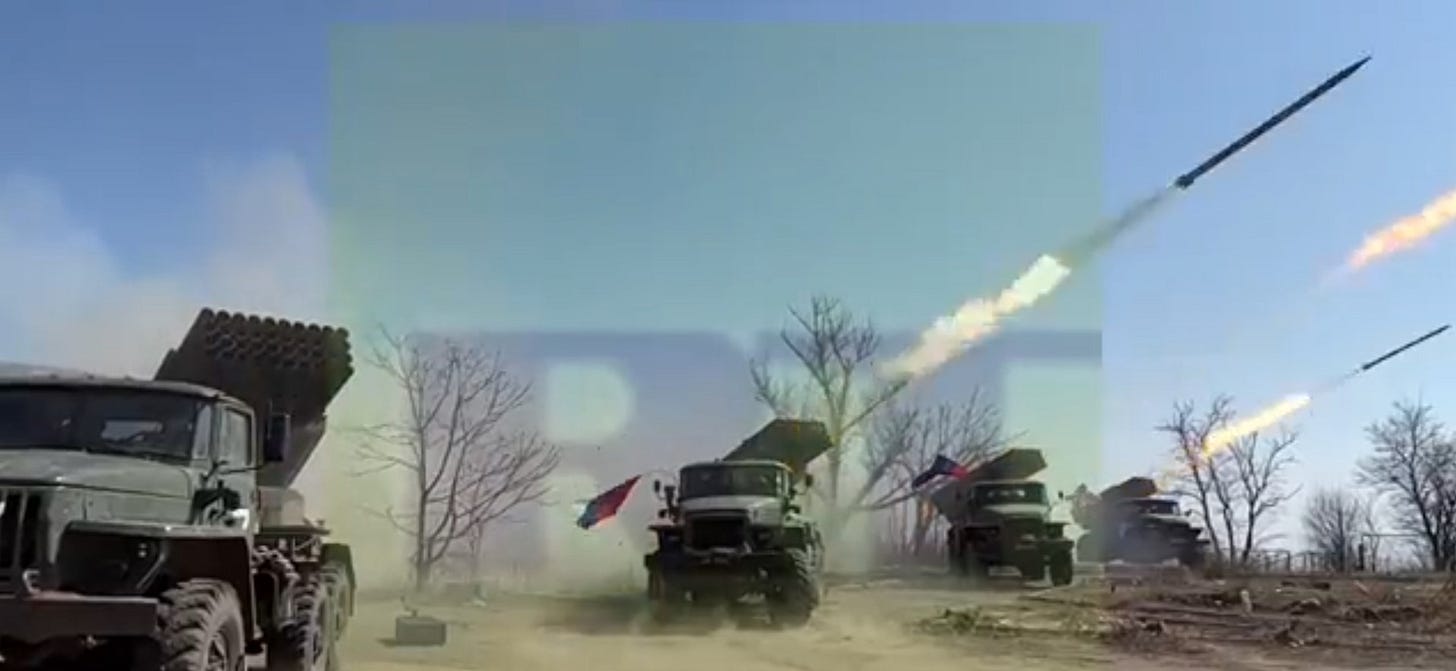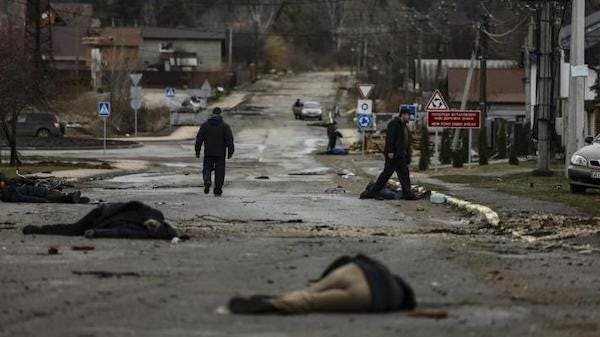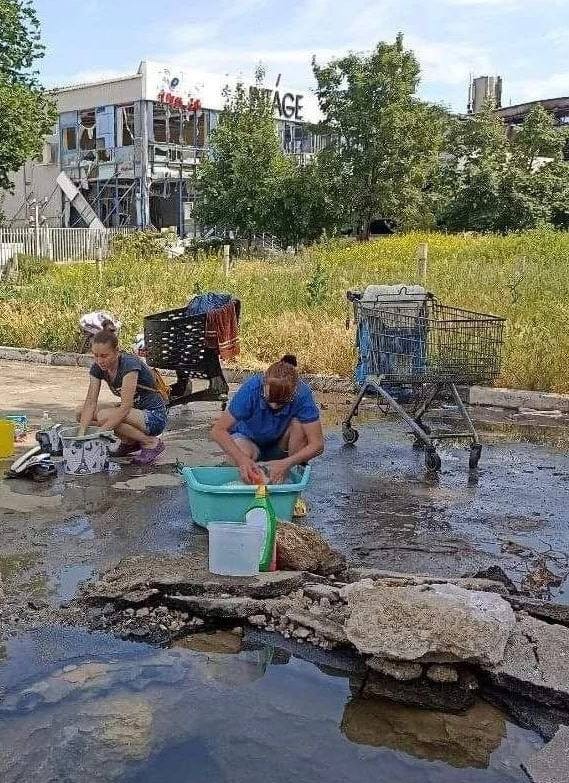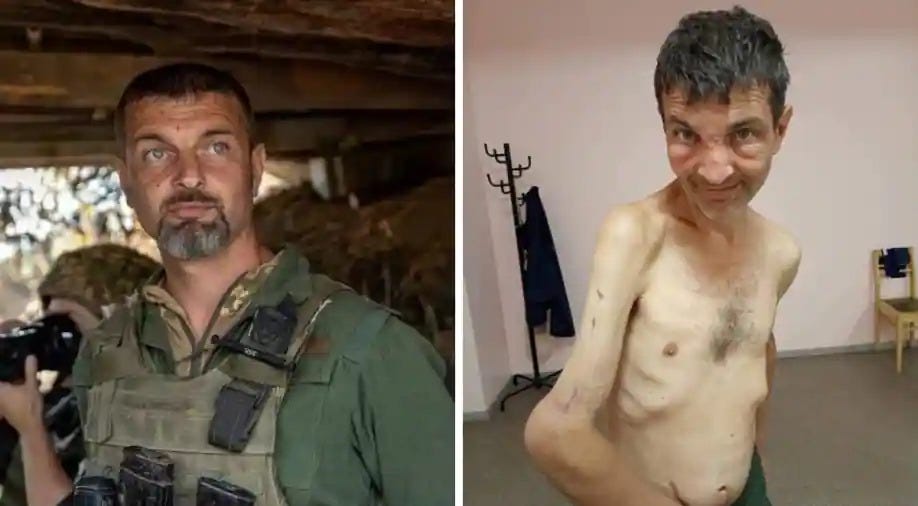On 23 February 2022 (24 February in Ukraine), I was up late at night, watching the UN Security Council (UNSC) as it convened in yet another attempt to prevent the war in Ukraine. For months, the UNSC had used the same rhetoric regarding condemnation of the accusations against Ukraine, Russian demands, and demands that Russia immediately withdraw its forces from the border of Ukraine and not to invade the nation. As this meeting convened, the pre-recorded speech at the Kremlin announcing the Russian “special military operation” in Ukraine would begin, with fighter aircraft and missiles striking across Ukraine within minutes. By dawn, the Russian forces would be pushing into Ukraine on the ground, conducting risky air assaults on places such as Hostomel airport.
Since that day, working with another YouTuber and subsequently on my own channel, I have been collecting open-source information on the war and the grim realities of it since the beginning of the conflict. Myself, along with the rest of The New News team, have gathered extensive evidence alone from open sources regarding the conflict and the atrocities committed so far. With that knowledge, there is only one conclusion we have been able to draw regarding the ongoing conflict: Russia is committing genocide and crimes against humanity in Ukraine. Here is why my team believes this.
What is genocide and crimes against humanity?
The crime of genocide is defined by the 1949 Geneva Conventions and the 1993 Rome Statute (which created the International Criminal Court) as:
In the present Convention, genocide means any of the following acts committed with intent to destroy, in whole or in part, a national, ethnical, racial or religious group, as such:
Killing members of the group;
Causing serious bodily or mental harm to members of the group;
Deliberately inflicting on the group conditions of life calculated to bring about its physical destruction in whole or in part;
Imposing measures intended to prevent births within the group;
Forcibly transferring children of the group to another group.
The term genocide was created in 1944 by Raphael Lempkin, a Polish-Jewish lawyer who fled to the United States in 1941 as Nazi Germany was taking over Europe. He created the term in order to describe the Holocaust, in which 6 million Jews, Poles, minorities, and other undesirable individuals were massacred by the Nazi regime.
The 1993 Rome Statute also outlines the definition for crimes against humanity, which is:
For the purpose of this Statute, ‘crime against humanity’ means any of the following acts when committed as part of a widespread or systematic attack directed against any civilian population, with knowledge of the attack:
Murder;
Extermination;
Enslavement;
Deportation or forcible transfer of population;
Imprisonment or other severe deprivation of physical liberty in violation of fundamental rules of international law;
Torture;
Rape, sexual slavery, enforced prostitution, forced pregnancy, enforced sterilization, or any other form of sexual violence of comparable gravity;
Persecution against any identifiable group or collectivity on political, racial, national, ethnic, cultural, religious, gender as defined in paragraph 3, or other grounds that are universally recognized as impermissible under international law, in connection with any act referred to in this paragraph or any crime within the jurisdiction of the Court;
Enforced disappearance of persons;
The crime of apartheid;
Other inhumane acts of a similar character intentionally causing great suffering, or serious injury to body or to mental or physical health.
For the purpose of paragraph 1:
‘Attack directed against any civilian population’ means a course of conduct involving the multiple commission of acts referred to in paragraph 1 against any civilian population, pursuant to or in furtherance of a State or organizational policy to commit such attack;
With these clearly defined, we can now begin to discuss the events of the war in Ukraine, and why such horrendous atrocities constitute genocide and crimes against humanity.
Scorched Earth Policy
As the war has dragged on, Russian forces have heavily relied on heavy artillery gunfire support to pound Ukrainian positions. Their weapon systems of choice are the BM-21 “Grad” system which fires up to 40 rocket salvos of 122mm Katyusha unguided rockets, the D-30 122mm towed artillery gun, 2S3 152mm self-propelled gun, and the 2S19 152mm self-propelled gun (though there are many, many more being utilized). The grad system, the most numerous artillery system in the battlespace, relies on a method known as “saturation bombardment”. The ideology is to use a massive amount of artillery to cover a general area as opposed to aiming it and attempting to hit a specific target.

This type of attack is, according to the 1949 Geneva Conventions and Additional Protocol I (adopted 1977) is considered indiscriminate when used against towns and villages. The city of Mariupol, according to the Ukrainian mayor, is stated to have been over 90% destroyed as a result of the fierce Russian encirclement and then continual bombardment of the city. Prior to the war in Ukraine, the city hosted a population of over 430,000 people.
Such types of shelling do not differentiate between military and civilian targets, even those like medical facilities which are explicitly protected by a multitude of international treaties. On 19 October 2022, the World Health Organization (WHO) in Ukraine confirmed that between 24 February and 10 October, 623 separate attacks had occurred on health care. Resulting in 100 deaths and 129 injuries.

Not only is each attack on a medical facility a war crime due to its nature, but in conjunction with other deliberate attacks on a population based on national lines (as them being Ukrainian), such attacks are furthering a cause of genocide by “Deliberately inflicting on the group conditions of life calculated to bring about its physical destruction in whole or in part;” by ensuring that the injured, ill, and those in need are unable to receive medical care and “Imposing measures intended to prevent births within the group;” by ensuring that safe facilities for women to do so are destroyed, increasing the possibility of mortality, if not just to outright kill the children and their mothers. On 9 March 2022, during a ceasefire for humanitarian corridors, Russia bombed Mariupol’s Maternity Hospital #3 multiple times causing at least 4 subsequent deaths, 1 still-birth, and 17 injuries.
Executions & Massacres
Well documented are the massacres and executions of civilians in places such as Bucha, Hostomel, Irpin, Izyum, Lyman, and so many others. In Bucha and the surrounding suburbs of Kyiv, Ukrainian civilians were found lying dead in the middle of the street, having been executed by Russian forces during their occupation. Others were hastily buried in mass graves. Women, having been raped, tortured, and finally executed were found wrapped in carpets and partially cremated (an attempt to cover-up Russian crimes). Mass graves of Ukrainian civilians are unfortunately all-too-common in areas liberated by Ukraine after spending months under Russian occupation. Most recently, areas such as Lyman and Sviatohirsk in the Donetsk Oblast of Ukraine have revealed over 150 civilians killed during the Russian occupation. Both Ukrainian and international teams of investigators continue to carefully sift through the evidence of Russian atrocities. Evidence is also continuously submitted to the International Criminal Court (ICC) to ensure that trials can begin once the war is over.

In total, 458 civilians would be found dead in Bucha alone, with over 1,300 and still counting being discovered throughout just the Kyiv Oblast of Ukraine post-occupation. Each civilian death, each torture victim, each victim of sexual and gender-based violence is a war crime, and these crimes equivalate to crimes against humanity in their own right. Under the 1949 Geneva Conventions, these instances of extreme violence display the crime of genocide in it’s purest form, under the sections of “Killing members of the group;” and “Causing serious bodily or mental harm to members of the group.” This has been perpetrated on national lines. The “crime” of the victims, being “Ukrainian”.

Incendiary Weapons Usage
Throughout the war in Ukraine, the usage of incendiary weapons has been widespread by Russian forces. It has been used in areas such as Nikopol, Mariupol, Bakhmut, Maryinka, and many others. The New News team has reported on incidents of incendiary weapons usage on Bakhmut, Donetsk Oblast alone on three separate occasions. The usage of incendiary weapons on civilian areas, including villages, towns, and cities, is specifically prohibited by Additional Protocol III (adopted 1983) on the Convention of Certain Conventional Weapons (adopted 1981). Protocol III states in Article 2 that:
1. It is prohibited in all circumstances to make the civilian population as such, individual civilians or civilian objects the object of attack by incendiary weapons.
2. It is prohibited in all circumstances to make any military objective located within a concentration of civilians the object of attack by air-delivered incendiary weapons.
3. It is further prohibited to make any military objective located within a concentration of civilians the object of attack by means of incendiary weapons other than air-delivered incendiary weapons, except when such military objective is clearly separated from the concentration of civilians and all feasible precautions are taken with a view to limiting the incendiary effects to the military objective and to avoiding, and in any event to minimizing, incidental loss of civilian life, injury to civilians and damage to civilian objects.
4. It is prohibited to make forests or other kinds of plant cover the object of attack by incendiary weapons except when such natural elements are used to cover, conceal or camouflage combatants or other military objectives, or are themselves military objectives.

This means that usage of incendiary weapons on civilian areas is prohibited through any means of delivery, including via aircraft, artillery and mortar shells. This is because incendiary weapons are not only indiscriminate in their nature of usage, but also especially inhumane. Incendiary munitions are substances which cause a chemical reaction which will burn continually at thousands of degrees (thermite burns at 4,000 degrees Fahrenheit, White Phosphorus burns at 5,000 degrees Fahrenheit). These substances will continue to burn until the chemical material is used up, and generally is not capable of being put out using standard firefighting equipment. These weapons do still have a purpose on the battlefield, just not as a weapon. Thermite is used as a demolition weapon, specifically for destroying things such as artillery guns, vehicle engines, radios, and other key items. White Phosphorus is used by artillery and mortar teams to produce a thick white smoke perfect for obscuring troop movements in a battlespace, and is often called “willy pete”.
The usage of incendiary munitions is not just banned on civilian targets, but military personnel as well. Under rule #85 of International Humanitarian Law (IHL) maintained via the International Committee of the Red Cross (ICRC) database, it is prohibited to use incendiary weapons against military personnel, unless no lesser means is possible to render them no longer combatants (hors de combat). Both rule #85 and Protocol III were broken when video footage was released on 15 May 2022 of Russian forces using 9M22S 122mm ‘Grad’ rockets, against the Azovstal steel plant, where nearly 1000 Ukrainian fighters and civilians remained besieged in the city of Mariupol.

The plan to use such munitions against civilian targets, in civilian areas, or against military personnel constitutes a war crime. The authorization of their usage in such circumstances is a war crime. Carrying out the order to use them in such circumstances is a war crime. These are not isolated incidents, but have been shown through repeated usage by multiple Russian units in several major offensives to be deliberate military tactics employed by Russian forces. As such, the usage of these munitions is considered to be crimes against humanity via the following definition:
“For the purpose of this Statute, ‘crime against humanity’ means any of the following acts when committed as part of a widespread or systematic attack directed against any civilian population, with knowledge of the attack:
11. Other inhumane acts of a similar character intentionally causing great suffering, or serious injury to body or to mental or physical health.”
Deportation Of Children
Russia has not only been accused of, but has openly admitted and even advertising it is taking Ukrainian children. The Russian Federation’s Commissioner for Children’s Rights Maria Lvova-Belova stated during an interview regarding Ukrainian “orphans” transferred to Russia that:
“When we brought them to the Moscow region so that they could get their strength back, at first they were negative about the president and said nasty things. They sang the Ukrainian anthem and that sort of thing… but later, that negative attitude turned into a love for Russia.” - Maria Lvova-Belova, Russian Federation Commissioner for Children’s Rights
The United Nations has stated that there is “credible” evidence that Russia has forcefully deported children from Ukraine to the Russian Federation, while the Ukrainian Prosecutor General’s Office states that nearly 9,000 Ukrainian children have been confirmed to have been forcefully deported from Ukraine to Russia.

Under the 1949 Geneva Convention and under the 1993 Rome Statute, the forceful deportation of children is considered a crime of genocide, stating: “In the present Convention, genocide means any of the following acts committed with intent to destroy, in whole or in part, a national, ethnical, racial or religious group, as such: Forcibly transferring children of the group to another group.”
Denial of Humanitarian Aid
Throughout occupied parts of Ukraine, it has been heavily reported that Russian forces have denied humanitarian aid to people in need throughout the regions. Basic necessities such as clean water, food, medical supplies, shelter, and other necessities required to support human life have been kept from Ukrainian civilians as they attempt to survive under Russian occupation. In Mariupol, Donetsk Oblast, the residents were not provided with any necessities after the entirety of their city was destroyed. Residents had to drink the contaminated water collecting in shell craters. The necrotic material of decomposing bodies seeping into the supply. Without sanitation, these craters also created the perfect conditions for widespread diseases, such as cholera, to infect and likely kill more people. There is no medication within the city either. Having run out during the siege, and never supplied by Russian occupational forces, individuals requiring medications such as those with diabetes either await a slow death, or must under-go amputation (reportedly without anesthesia). When the Russian Red Cross did come to provide humanitarian aid to the city, they were so overwhelmed that they stopped delivering aid early and left without finishing distribution.

Similar scenes have played out across other parts of Ukraine. On 29 July 2022, Saviano Abreu who is the representative of the UN Office for the Coordination of Humanitarian Affairs (OCHA) stated:
“We realize it is not enough. Many Ukrainians currently live under the russian occupation. The UN and other aid organizations were unable to deliver the necessary humanitarian cargo there,”. - Saviano Abreu, UN Representative for OCHA
Russian forces have not stopped at just the denial of humanitarian aid and assistance, but in some cases actively targeted such groups. A base of operations for the International Committee of the Red Cross (ICRC) evacuation teams was targeted by Russian shelling in Sloviansk, Donetsk Oblast on 30 August, 2022. The Red Cross is the only organization explicitly mentioned by name within the Geneva Conventions regarding safeguarding humanitarian rights and aid. While the denial of humanitarian aid constitutes genocide according to the 1949 Geneva Conventions by stating: “In the present Convention, genocide means any of the following acts committed with intent to destroy, in whole or in part, a national, ethnical, racial or religious group, as such: Deliberately inflicting on the group conditions of life calculated to bring about its physical destruction in whole or in part;”.

Filtration Camps
The usage of “Filtration Camps” throughout Ukraine has become widely reported as well. Filtration camps (also known as filtration points) were developed during the first and second Chechen wars by the Russian Federation. These camps, such as the Izoliatsiia, or Isolation Colony. Another one is located in Olenivka, where many inmates are suspected to have been massacred by Russian forces who later stated it was a HIMAR rocket strike. Conditions in these camps are often described as those being in line with concentration camps. Deprivation of food, water, sleep, medical treatment. Systematic beatings, rape, torture, and extra-judicial executions are common. Mykhailo Dianov, a Ukrainian soldier captured at the surrender of the Azovstal was released back to Ukraine. The Ukrainian Ministry of Defense shared his before and after photos on Twitter.

Recounts of such activities have existed prior to the war in Ukraine. With the penal colonies expanding once Russian forces took control of areas within the Donbas. Accounts such as those of Stanislav Aseyev, who was incarcerated at the Izoliatsiia colony by members of the Russian-backed DPR in 2014 was interviewed by the renowned Harvard International Review which was published on 4 December 2020 documenting his experience. Similar conditions were noted during the First and Second Chechen war, with many human rights groups publishing reports. One of the most notable of these reports being Welcome To Hell by Human Rights Watch (HRW). Only one individual was ever prosecuted for these crimes: Sergei Lapin, callsign “Kadet”. He was awarded a medal by President Putin prior to his arrest “for protecting public order” as a result of his operations in Chechnya. He would later be found guilty of torturing one of the unaccounted for victims of the filtration system, and sentenced to 11 years in prison.

Pillaging
Russian forces have been seen looting Ukrainian civilians' homes of everything from children's toys and blankets, to valuable electronics, and most notably appliances such as washing machines. Under the 1949 Geneva Convention, the act of pillaging is a war crime. Yet we have seen where entire vehicles are stuffed and piled high with looted goods, usually before a withdrawal of forces from an area. Many of these items are shipped home back to Russia via postal services in occupied areas, or in allied areas such as in Belarus.

Sexual & Gender Based Violence
In reports similar to those from Nanking, China during World War II. Immense accounts of sexual assault, rape, and other types of gender-based violence have occured on the account of Russian forces. It has been reported by victims that the Russian troops came prepared by the Russian army, with Viagra. Intercepted phone calls home reveal Russian wives and girlfriends telling their men to be sure to “wear a condom” when sexually assaulting women in Ukraine. These reports from Ukrainian sources correlate with the official report given to the United Nations by the Independent International Commission of Inquiry on Ukraine, which was created by the UN Human Rights Council (UNHCR) to investigate the war in Ukraine and the allegations of war crimes, crimes against humanity, ethnic cleansing, and genocide. As per their report on 18 October 2022:
“In the period and locations under review, the Commission has been investigating cases of rape committed by some Russian armed forces soldiers in localities that came under their control, which are war crimes. Victims range from four to over 80 years old. Perpetrators raped the women and girls in their homes or took them and raped them in unoccupied dwellings. In most cases, these acts also amount to torture and cruel or inhumane treatment for the victims and for relatives who were forced to watch. Other incidents of sexual violence were also documented against women, men, and girls. The Commission continues to investigate the extent to which sexual and gender-based violence constituted a widespread pattern.” - Advanced Report, 18 October 2022, Independent International Commission of Inquiry on Ukraine
Such widespread acts of gender based violence directly violates not only the 1949 Geneva Conventions, it constitutes crimes against humanity under the following provision: “For the purpose of this Statute, ‘crime against humanity’ means any of the following acts when committed as part of a widespread or systematic attack directed against any civilian population, with knowledge of the attack: Rape, sexual slavery, enforced prostitution, forced pregnancy, enforced sterilization, or any other form of sexual violence of comparable gravity;”. This also means that Russia has failed to uphold its obligations as a state which is party to the Convention on the Elimination of All Forms of Discrimination against Women (CEDAW, adopted 1979).
Author’s Opinion
These are just a few listed examples of a plethora of information available within the public space regarding the atrocities committed by Russian Forces in Ukraine. Each image and video of this war captured by every smartphone in Ukraine has the potential to be used as evidence in the International Criminal Court. Genocide, ethnic cleansing, and crimes against humanity have clearly been perpetrated against Ukraine in just the existing information available. Let alone undocumented cases, or the horrors which will become public once further areas of Ukraine have been liberated. Treaties did not stop Hitler and the Holocaust. International condemnation did not stop the Hutus in Rwanda. The International Criminal Court punishes such actions, but it cannot stop them.
Ukraine, at this point in time, is fighting for the rights of its people, heritage, and culture to exist. Russia is committing genocide based on national lines of the Ukrainian people, and to ask for Ukraine to negotiate a peace with such actions is a failure of not just comprehension of the situation, but a failure of our morality as a whole. The evidence is clear, the choice is clear. In the words of Elie Wiesel, Holocaust survivor, author, activist, and Nobel peace prize laureate:
“We must take sides. Neutrality helps the oppressor, never the victim. Silence encourages the tormentor, never the tormented. Sometimes we must interfere. When human lives are endangered, when human dignity is in jeopardy, national borders and sensitivities become irrelevant. Wherever men and women are persecuted because of their race, religion, or political views, that place must - at that moment - become the center of the universe.” - Elie Wiesel, Nobel Peace Prize Acceptance Speech, 10 December 1986



